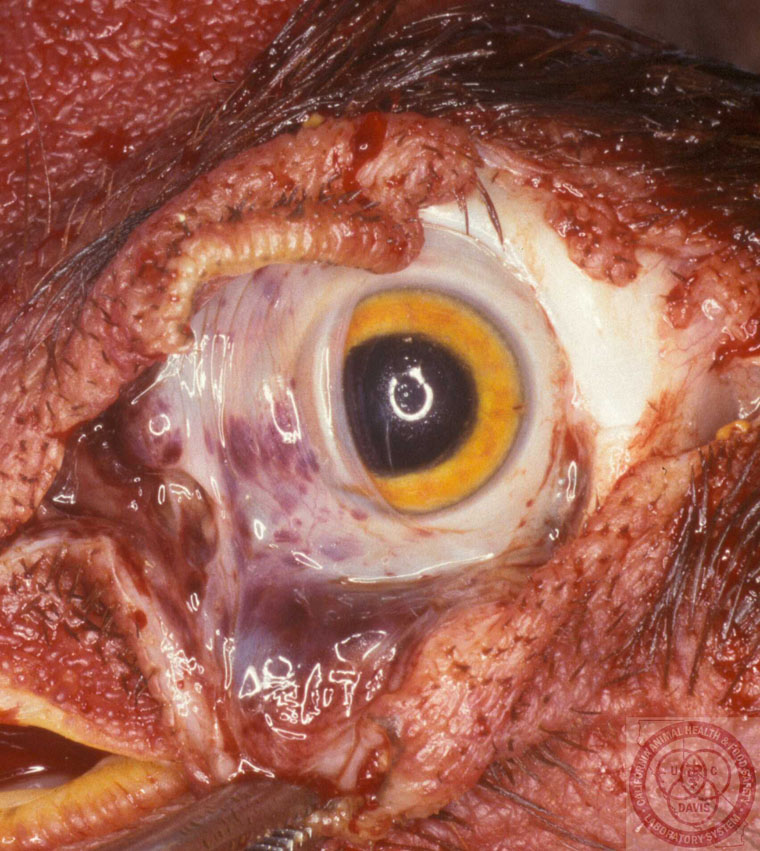Newcastle disease
Newcastle disease (English: Newcastle Disease or pseudo Fowlpest ) is a common worldwide, extremely contagious and notifiable viral disease of birds. The clinical picture is reminiscent of the avian influenza ( "bird flu" ), so the Newcastle disease in the art is also referred to as atypical avian influenza.
Pathogen
Causative agent of Newcastle disease Newcastle disease virus (NDV ), a single (-)- strand RNA virus ( ss (-) RNA) of the family Paramyxoviridae, subfamily Paramyxovirinae, and the 2001 newly created for the NDV genus Avulavirus assigned. Originally it was expected that NDV to the genus Rubulavirus, which also includes the causative agent of mumps human and kennel cough dogs.
An NDV ill primarily chickens and turkeys of all ages, but occasionally pigeons, geese, ducks, pheasants, partridges, quails and ostriches. Even with penguins, crows, parrots and canaries, the disease may occur. In humans, the virus call in some cases produced a conjunctivitis.
Transmission paths
Infected animals excrete the virus from Newcastle in large quantities via feces, body fluids, nose, throat, eyes and respiratory secretions air. Therefore, the pathogen can spread both directly from animal to animal as well as over the air, also on eggs, fresh and frozen meat and dried egg. The virus can survive for up to half a year in dried egg even several years in frozen foods.
If infected but not yet sick animals from which eggs or meat products transported, the viruses can be also spread by cages or packaging material. Also, by stable dust adhering to shoes, clothing or vehicle tires, the virus can be spread from farm to farm.
Symptoms
The clinical picture of Newcastle disease initially has numerous nonspecific changes in behavior and appearance of the animals as they also occur in other acute infections:
- Drastic drop in egg production and thin -skinned to shell-less egg
- High fever up to 43 ° C
- Apathy and lack of appetite
- Watery diarrhea, possibly bloody
- Shortness of breath; Beak and eyes are covered with thick mucus
- Circulatory disorders, often with dark comb - staining
- High mortality rate within five days after onset of symptoms
The incubation period is 4-6 days. With rapid spread within the herd deaths can occur without obvious symptoms beforehand.
The viruses infect lung, intestine, and central nervous system and may, inter alia, pinpoint bleeding on the gastric mucosa, especially around the excretory ducts of the gastric glands that cause.
In rare cases, people who are in close contact with diseased animals, an inflammation of the conjunctiva of the eye may occur.
Combat
Sets Veterinary Newcastle disease resistant, usually a closed area for poultry in a radius of at least three kilometers will be established. The poultry in this area must remain on the instructions of the veterinary three weeks in the barn to protect against spread of the disease. Breeders must report their holdings. In addition, an observation area can be set up at least double radius. Infected animals must be killed immediately. Affected stables, buildings and transport vehicles are disinfected. The animal facilities, where appropriate, additional persons and imposed traffic restrictions.
Prevention
In Germany the avian influenza Regulation provides for a regular vaccination against Newcastle disease for each chicken and Truthühnerbestand. This also applies to individuals who hold only a few chickens. The vaccination is usually done via the drinking water.
Chickens or turkeys may only be issued in Germany of a poultry flock to another, or to poultry markets, poultry shows and similar events will be issued if they are accompanied by a veterinary certificate attesting that the effect that the herd of origin of the animals (in the case of day-old chicks of the parents livestock ) has been regularly vaccinated against Newcastle disease.










